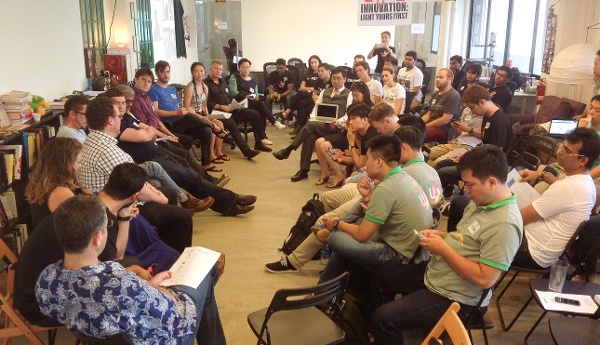JFDI Program Manager, Kai Huang works with hundreds of startups every year through our Accelerate and Discover Programs. He learns not by merely reading decks and applications, but by working closely with startup founders in Asia, writes David Ongchoco.

Four aspects of submissions to JFDI often stand out for Kai as open for improvement.
1. Distribution
A lot of times, startups will create their product before figuring out how they will market or sell it. Kai pulled up the Lean Canvas and emphasized how the ‘Channel’ section is one of the sections that are often overlooked.
He shared, “Startups should start thinking about channels from the very start and start testing different channels because there are many different ways to reach a customer, and every channel has a different cost.”
An example Kai gave is how the customer acquisition costs usually relate to the customer lifetime value. The channels also depend on whom you’re targeting. If you’re targeting enterprises then you probably have a sales team. If you’re targeting consumers, you probably will setup digital marketing campaigns. He added, “You need to spend 50% of your energy on product and 50% on channel development.”
2. Metrics
When you’re building a product, if you don’t think about the metrics you measure, you won’t be able to know if you’re growing. A lot of times, founders end up measuring the wrong things. Kai emphasized, “It’s very product specific. You want to think about the workflow, the journey and how you want people to interact with your product.”
Kai believes that founders should think through how they want the user to interact with their product and what the specific behavior and outcome they’re looking for is. Kai shared, “Once you start thinking about the expected user journey then compare this with the metrics you’re seeing, you’ll realize that you’re just making a lot of assumptions so you have to validate and start talking to people.”
Kai adviced startups to use third party analytics tools and really capture all the events that happen in the product. He shared, “Founders will never know if what they’re doing is moving the needle unless they know what to measure.”
3. Priorities
When you do a startup, time is against you. Time is the most precious resource you have. Kai shared, “The problem is when I talk to startups and ask them what their top priority is, a lot of founders always give me so many answers.” The problem with trying to accomplish three things at the same time, you usually end up doing worse in all three things.
On the flipside, Kai believes if you focus on one thing at a time, the learning you get from each task, experiment or option is a lot more defined. He shared, “The learning you get from trying the first option, helps you refine the next option. There’s also a chance you discover the best option earlier since you’re doing it one by one and you’re not doing it concurrently.”
Kai also emphasized the importance of using the Objective Key Results framework, and focusing on one objective for a set period of time. He shared, “The point I’m trying to drive is that when you’re trying to do multiple things, you have no control on how long those will take. It’s very hard to reflect because you’re doing three different things. When you’re just one thing, the lessons and reflections are very focused.”
4. Vision
In order to create a disruptive startup that will be able to grow and gain traction, one must have a vision that is big enough. Kai shared, “Basically, if the vision is not big enough, you won’t have the confidence to tackle all the difficult challenges and questions of running a startup.”
It is the vision that will keep you going as you climb up the mountain. Kai shared while JFDI teaches the lean startup method, it’s important not to forget the bigger vision. “You can’t get too obsessed with building a product. You also have to build a company.”
Kai added, “Sometimes, people are doing entrepreneurship for the wrong reason. Just because they can’t stand working for a boss, they find any problem they think is epic and start a company, but then that problem is actually not that epic.”
A lot of people also don’t understand that entrepreneurship is hard. He shared, “They just don’t realize that vision is so important because entrepreneurship is hard. Sometimes, it comes with maturity. They don’t see how important it is to see the big picture, to aim for the highest possible peak until later on.”

The JFDI Accelerate Class 2015A at the Corporate Demo Day in PayPal’s Singapore Headquarters
Speaking of the JFDI Accelerate Program, our 2015B Applications are now open. Our mentors, founders and investors form the perfect ecosystem for your startup to succeed in Asia. More than 60% of our Accelerate startups receive seed funding.
 David Ongchoco is a content marketing intern for JFDI Asia. He currently studies at the University of Pennsylvania and runs an international nonprofit called YouthHack, which has a goal of helping students learn more about startups, technology and entrepreneurship. He also contributes for top publications like the Huffington Post, Technical.ly Philly and the Philippine Daily Inquirer.
David Ongchoco is a content marketing intern for JFDI Asia. He currently studies at the University of Pennsylvania and runs an international nonprofit called YouthHack, which has a goal of helping students learn more about startups, technology and entrepreneurship. He also contributes for top publications like the Huffington Post, Technical.ly Philly and the Philippine Daily Inquirer.

